الرؤساء السابقون
Former Presidents /Présidents
antérieur
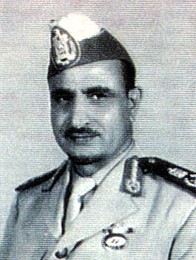 المشير : عبدالله يحيى
السلال 1962 – 1967 : المشير : عبدالله يحيى
السلال 1962 – 1967 :
الميلاد في قرية شعسان
مديرية سنحان محافظة صنعاء عام 1917.
التحق بمدرسة الايتام عام
1929، وبعد اتمامة للمرحلة الثانوية سافر الى العراق
عام 1936 في بعثة عسكرية.
شارك في مرحلة النضال الوطني
وسجن عدة مرات .
اختاره تنظيم الضباط الاحرار
قائداً لثورة سبتمبر/ ايلول ليصبح اول رئيس للجمهورية في
الشمال.
اطيح به في انقلاب تم في 5
نوفمبر / تشرين ثان 1967اثناء زيارته للعراق ، انتقل بعدها
للاقامة في مصر التي ظل فيها حتى صدور قرار الرئيس علي
عبدالله صالح في سبتمبر/ ايلول 1981 بدعوته مع
القاضي الارياني للعودة الى الوطن.
توفى بمدينة صنعاء في 5 مارس
/ آذار 1994.
Marchal : Abdullah Yahya
Al-Salal (1962-1967)
He was born in Shasan village,
Sanhan District , Sana’a city in 1917 and joined
an orphanage in 1929. After he graduated from high
school, he traveled to Iraq in a military expedition in
1936. He also participated in the phase of national
struggling and was held as a prisoner several
times.
He was chosen by the liberated
soldiers organization to be the leader for September
Revolution to become the first president in the North
Republic of Yemen.
On the fifth of November 1967,
he was brought down in a bloodless coup during his visit
to Iraq. Afterwards he moved to settle in Egypt. In
September 1981, the president Ali Abdulah Saleh has
decided to return him back to Yemen with Al- Eryani
judge.
He died in Sana’a on the fifth
of March in 1994.
Il vit le jour dans le village
de Shasan (district de Sanhan) en 1917 et est placé dans
un orphelinat en 1929.
Après avoir obtenu son diplôme
d’études secondaires il particpe à une expédition
militaire en Irak en 1936. Il prend part aux combats et
est fait prisonnier à plusieurs
reprises.
Il sera choisi par
l’organisation libérale des soldats comme chef de la
révolution de septembre et deviendra le premier
président de la république arabe du Yémen le 5 novembre
1967.
Il perd le pouvoir lors d’un
coup sanglant alors qu’il est en visite en
Irak.
En septembre 1981, le
président Ali Abdullah Saleh décide de le laisser
revenir au Yémen en même temps que le cadi Al - Eryani.
Il meurt à Sana’a en
1994.
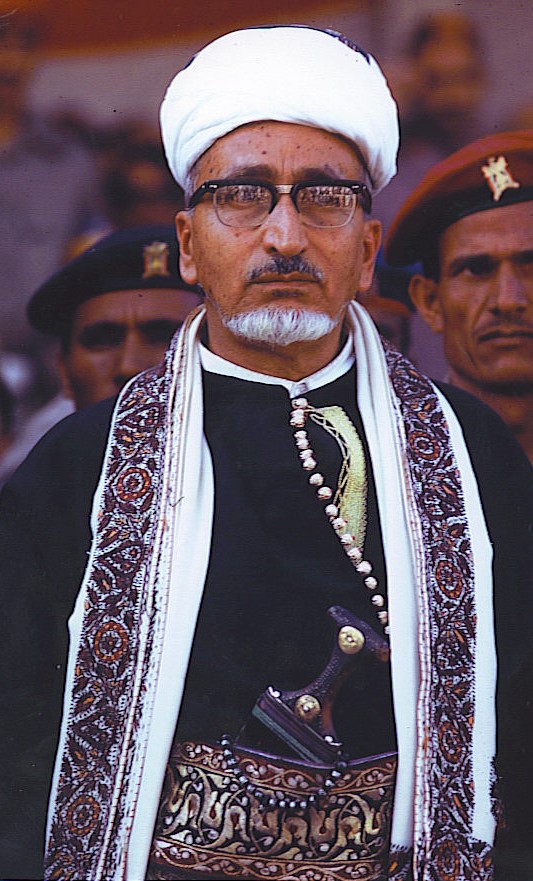 القاضي : عبد الرحمن يحيى
الارياني 1967 – 1974 : القاضي : عبد الرحمن يحيى
الارياني 1967 – 1974 :
الميلاد حصن اريان
بمحافظة إب 1910.
زعيم ديني وسياسي. عضو مجلس
قيادة الثورة 1962، ثم وزيراً للعدل. شارك في مراحل النضال
الوطني ضد الامامة وسجن.
اطيح به في إنقلاب أبيض في
13 يونيو / حزيران 1974.
توفى في 14 مارس / آذار
1998بالعاصمة السورية دمشق التي ظل مقيما فيها رغم عودتة
الى اليمن في شهر سبتمبر/ايلول
1981.
Judge : Abdulrahman
Al- Eryani (1967-1974)
He was born in Eryan Fort of
Ibb City in 1910. He was a religious and a political
leader. After being a member of Revolutionary Command
Council in 1962, he became the minister of justice. He
participated in the phase of national struggling against
emanate and was jailed.
On the thirteenth of June
1974, he was brought down in a bloodless
coup.
Although he returned back to
Yemen in September 1981, he lived and died in
Damascus on the fourteenth of
March 1998.
Né en 1910 au fort d’Eryan à
Ibb. Chef religieux et chef politique.
Après avoir été membre du
Conseil de Commandement Révolutionnaire en 1962, il est
nommé ministre de la justice. Il a pris part à la phase
initiale de la lutte contre l’Imam ce qui lui a valu
d’être jeté en prison.
Le 13 juin 1974 il est déposé
dans un coup d’état sans effusion de sang et exilé à
Damas en Syrie. Bien qu’il soit revenu au Yémen en
septembre 1981, il a passé la majeure partie du reste de
son existence à Damas (Syrie) où il est décédé le 14
mars 1998.
 المقدم : ابراهيم محمد الحمدي 1974 – 1977
: المقدم : ابراهيم محمد الحمدي 1974 – 1977
:
ولد في عام 1943في
مدينة قعطبة- محافظة إب وتعلم في معهد عسكري في عهد الامام
احمد يحي حميدالدين(حاكم اليمن من عام 1948-1962) واصبح في
عهد الرئيس السلال قائداً لقوات الصاعقة، ثم مسئولاً عن
المقاطعات الغربية والشرقية والوسطى.
في عام 1972اصبح نائب رئيس
الوزراء للشؤون الداخلية، ثم عين في منصب نائب القائد
العام للقوات المسلحة، وفي 13/6/1974 ، قام بانقلاب عسكري
ابيض( قام كذلك بتوديع الرئيس الارياني رسميا في المطار
مغادرا الى دمشق المدينة التي اختارها للاقامة مع افراد
عائلته ).
انتهج سياسة مستقلة عن
السعودية خارجياً وسياسة معادية للقبائل داخلياً.
] قام
بالانقلاب وهو برتبة عقيد وأصدر قراراً في ما بعد بانزال
جميع الرتب العسكرية الى رتبة المقدم
[.
عندما اندلعت الحرب الأهلية
اللبنانية في فبراير / شباط 1975م دعا الى عقد قمة عربية
طارئة ، كما اقترح تشكيل قوات ردع عربية.
قتل في ظروف غامضة في
11/10/1977 عشية سفره الى الجنوب لإعلان بعض الخطوات
الوحدوية في اول زيارة لرئيس شمالي الى
الجنوب.
Lieutenant Colonel :
Ibrahim Mohammed Al-Hamdi
(1974-1977)
He was born in Qatbah of Ibb
City in 1943, studied in a military institute in the
period of rule of Ahmed Yehya Hameed Adeen ( The ruler
of Yemen from 1948 to 1962) and became the leader of
commandos in Al-Salal period of rule. After that, he was
in charge of the eastern, western and median
districts.
In 1972, he became the deputy
of the prime minister in the internal affairs. Then he
was nominated the deputy of the higher commander of the
armed forces.
On the thirteenth of June 1974
he staged a bloodless coup (He farewelled the president
Eryani at the Airport to Damascus that is the city he
chose to live with his family)
and possessed alone a
self-governed policy that differs from Saudi Arabia and
against tribes inside Yemen.
He staged the coup when he was
a colonel. Later, he made a decision to demote all
military ranks to lieutenant colonels. In the beginning
of the Lebanese Civil War in 1975, he has been asked to
hold an urgent Arab summit meeting as the Arabian
Restraint Force Formation has
suggested.
While he was traveling as the
first northern president to the south in the evening to
announce some unionism steps, he got killed in
mysterious conditions on the eleventh of October
1977.
Il voit le jour à Qatbah, dans les environs de
Ibb en 1943.
A étudié à l’Institut
militaire durant le règne de l’Imam Ahmed Yehya Hameed
Adeen (souverain du Yémen de 1948 à 1962) avant de
devenir le chef des commandosdurant le règne du maréchal
Salal. Plus tard il fut responsable des territoires de
l’Est, du Centre et de l’Ouest du
Yémen.
En 1972, il devient vice
ministre de l’Intérieur avant d’être nommé vice
commandant en chef des forces armées.
Le 13 juin 1974, il prend le
pouvoir dans un coup d’état sans effusion de sang
(Il adieu le Président Eryani à l'aéroport vers
Damas qui est la ville qu’il a choisi de vivre avec sa
famille) et entame une politique personnelle qui
l’écarte de l’Arabie Saoudite et l’oppose au tribus du
Yémen.
Lors du coup d’état, il était
colonel mais décide plus tard de ramener ce grade à
celui de lieutenant colonel.
Au début de la guerre civile
au Liban en 1975, il lui est demandé de réunir d’urgence
un sommet arabe comme le suggère la formation de la
force arabe de contrôle.
Il annonce les premiers pas de
la réunification alors qu’il se rend en visite au sud
Yémen.
Il est assassiné dans de
mystérieuses conditions le 11 octobre
1977.
 المقدم : احمد حسين
الغشمي 1977 – 1978 : المقدم : احمد حسين
الغشمي 1977 – 1978 :
الميلاد في
]ضلاع
همدان[ احدى
ضواحي صنعاء عام 1941.
التحق بالقوات المسلحة بعد
قيام ثورة سبتمبر ، وتولى مهام ومسئوليات قيادية عسكرية
كرئيس لاركان حرب فوج، وقائداً للمحور الغربي ثم الشرقي،
واللواء الآول مدرع.
اسهم بدور رئيسي في حركة
13/6/1974 التصحيحية ، وتولى منصب رئيس الاركان ثم نائبا
لرئيس مجلس القيادة(رئاسة الدولة).
اغتيل في مكتبه برسالة مفخخة
نقلها مبعوث لرئيس الشطر الجنوبي في
24/6/1978.
Lieutenant Colonel :Ahmed
Hussein Al- Ghashmi (1977-1978)
He was born in Thelaa
Hamdan one of Sana’a suburbs in 1941.
After September Revolution, he
joined the military forces and operated military tasks
as the chief of staff in battalion war and as a leader
in the eastern and western centers.
He played and important role
in Correction Organization in 1974 and was in the power
as the chief of staff. Then he became the
vice-president.
On the twenty fourth of June
1978 he was assassinated in his office with a trapped
letter, which was delivered by a special messenger from
the one who was in charge of the southern part of
Yemen.
Né dans le quartier de Thelaa
Hamdan, banlieue de Sana’a en 1941.
Après la révolution de
septembre, il rejoint les forces armées et poursuivit
une carrière militaire comme chef d’état Major dans un
bataillon et commandant des secteurs Est et Ouest. Il a
joué un rôle important dans l’organisation du mouvement
de correction de 1974 en tant que chef d’état-major,
avant de devenir vice-président de la
république.
Il est assassiné le 24 juin
1978 par un messager spécial de la république populaire
et démocratique du sud Yémen qui lui remet une lettre
piégée.
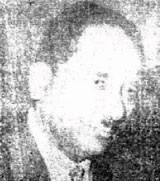 قحطان محمد الشعبي
1967 – 1969 : قحطان محمد الشعبي
1967 – 1969 :
ولد في لحج عام
1920،
عمل لعدة سنوات في
وزارة الزراعة، واصبح في 1955 مديراً لادارة الاراضي. عام
1958 التحق للنضال ضد الاستعمار البريطاني فانضم الى رابطة
الجنوب العربي، ثم استقال عام 1960 واسس الجبهة القومية
لتحرير الجنوب المحتل ، وبدأ الكفاح المسلح عام 1963،
وقبله بعام كان الرئيس السلال قد عينه مستشاراً له لشؤون
الوحدة.
ترأس في نوفمبر / تشرين ثان
1967 الوفد اليمني الى محادثات جنيف الرامية لمنح
الاستقلال.
اصبح اول رئيس
للجمهورية وقائداً أعلى للجيش.
اُقيل من منصبه في 22 يونيو
/ حزيران 1969 ووضع تحت الاقامة الجبرية
.
توفى في عدن عام
1982.
Qahtan Al-Shaabi (
1967-1969)
A political Yemeni, who was
born in Lahj in 1920, worked in Ministry of Agriculture
for several years. He became the responsible man of
lands management in 1955. Three years later, he joined
the struggling against British Colonization and was a
member of the Arab Southern Committee. He resigned in
1960 and founded the National Front to liberate the
occupied south. In 1962, he was Al-Salal’s unity affairs
consultant. One year later, he started armed
struggling.
In 1967, he was at the head of
Yemeni delegation to Geneva conversations which aimed to
present independence. At the same time he became the
first president of Yemen and also the higher commander
of the Yemeni army.
On the twenty second of June
1969, he was deposed and put under house
arrest.
In 1982, he died in
Aden.
Leader politique yéménite né à
Lahej en 1920. Exerça les fonctions de ministre de
l’agriculture pendant plusieurs années.
Devint le responsable de
l’aménagement du territoire en 1955. Trois ans plus
tard, il rejoint le mouvement de lutte contre
l’occupation britannique et devient membre du comité
d’Arabie du Sud. Il démissionne en 1960 et fonde le
Front National de Libération du Sud Yémen. En 1962, il
était consultant du président Salal; pour les affiares
relatives à l’unification. Un an plus tard il commença
la lutte armée.
En 1967, il mena les
négociations de Genève qui menèrent à l’indépendance du
sud Yémen. Au même moment il accède à la première
présidence du Yémen et devient commandant en chef
des armées du Yémen.
Le 22 juin 1969, il est déposé
et mis aux arrêts. Il mourra à Aden en
1982.
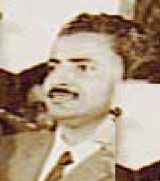 سالـم ربيع علي : 1969 –
1978 : سالـم ربيع علي : 1969 –
1978 :
الميلاد عام 1935 في
ابين.
تلقى تعليمه في عدن وعمل في
التعليم، ومارس مهنة المحاماة.
انضم في اواخر
الخمسينيات الى منظمة الشباب القومي، وشارك مشاركة قيادية
في نشاطات الجبهة القومية لتحرير اليمن الجنوبي
المحتل.
كان عضواً في القيادة
العام للجبهة القومية واصبح رئيساً للمجلس الرئاسي منذ
العام 1969.
بدأت في فترة حكمه المباحثات
الوحدوية بغية التوصل الى صيغة تقارب وحدوي بين شمال اليمن
وجنوبه.
اتهم عام 1978 بتدبير مؤامرة
للاستئثار بالسلطة، وتدبير عملية اغتيال رئيس اليمن
الشمالي احمد الغشمي ، واعدم بعد ذلك مع مجموعة من انصاره
في عدن بعد هزيمتهم في المواجهة المسلحة القصيرة مع مجموعة
عبدالفتاح.
Salem Robea Ali :
(1969-1978)
He was born in Abyan in 1935,
studied in Aden and worked as a tutor. He was a lawyer,
though. In late 1950s he joined National Youth
Organization. He was also a member of the leadership of
National Front and participated as a leader in National
Front activities to liberate the occupied south in
Yemen. In 1969, he became the president of the
Presidential Council
The unionism discussions have
began in his period of rule aiming to unite the south
and north of Yemen.
In 1978, he was accused of
managing a conspiracy to topple the authority and
assassinating the president Al-Ghashmi. As a consequence
he has been executed in Aden with a group of his
supporters after they have been defeated in a short
armed confrontation with Abdulfatah
group.
Né à Abyan en 1935,
étudie à Aden et travaille comme répétiteur. Il devient
avocat. À la fin des années 50, il rejoint
l’organisation nationale de la jeunesse. Il devient
également membre directeur du front national et
participe en tant que responsable aux activités du front
national pour libérer le sud Yémen occupé. En 1969, il
devient président du conseil
présidentiel.
Les discussions sur la
réunification des deux Yémen ont commencé sous sa
présidence.
En 1978, il est accusé d’avoir
pris part à la conspiration qui a mené à l’assassinat du
président Al Ghashmi. Ces allégations sont suivies d’une
confrontation armée avec le groupe d’Abdulfatah qui
prend le dessus et l’exécute avec ses
partisans.
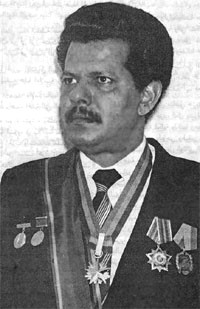 عبد الفتاح اسماعيل الجوفي : 1978 –
1980 : عبد الفتاح اسماعيل الجوفي : 1978 –
1980 :
الميلاد في عدن عام
1939 لأبوين من فلاحي الشمال.
اتم دراسته الابتدائية
والمهنية في مدارسها، عمل في شركة النفط البريطانية عام
1957.
انضم في عام 1959 إلى
الجبهة القومية لتحرير جنوب اليمن من الاحتلال
البريطاني.
اصبح في عام 1964 المسؤول
العسكري والسياسي عن نشاطات الجبهة في عدن، واختير عضواً
في اللجنة التنفيذية القومية في عام 1965، وبعد الاستقلال
عام 1967 عين وزيراً للثقافة والارشاد القومي ووزيراً
مسؤولاً عن قضايا الوحدة مع الشطر الشمالي ( لم يقم باي
زيارة للشمال طوال فترة وجوده على المسرح
السياسي)
في عام 1969 انتخب اميناً
عاماً للجبهة. وبقي في هذا المنصب حتى عام
1975.
عضو مجلس الرئاسة عام
1969.
رئيساً مؤقتاً لمجلس الشعب
الأعلى عام 1971 .
وفي عام 1978 عين رئيساً
لمجلس الرئاسة ثم عين في العام نفسه أميناً عاماً للحزب
الاشتراكي اليمني الذي حل محل الجبهة
القومية.
استقال في ابريل / نيسان
1980 من جميع مهامه بحجة الاسباب الصحية، وعاش في المنفى
في الاتحاد السوفيتي السابق حتى سمح له بالعودة بعد خمس
سنوات لتندلع أحداث 13 يناير / كانون ثان 1986 والتي اختفى
خلالها في ظروف غامضة.
Abdulfatah Ismail :
(1978-1980)
He was born in Aden in 1939.
He completed his elementary study and started his career
in a school in the south.
In 1957, he worked for a
British oil company. In addition, he joined the National
Front to liberate the southern part of Yemen from
British occupation. In 1964, he became in charge of the
military and political activities of the Front in Aden.
After one year, he has been tested as a member in the
National Executive Committee in 1965. After the
independence in 1997, he was nominated the Minister of
Culture, Minister of National Guidance and responsible
of union matters in the southern part (He has never
visited the north) In 1969, he has been elected to be
the Front’s secretary-general. Still in his position
until 1975.
In 1969, he became a member of
the Presidential Council.
In 1971, he became a temporary
chairman of People’s Council.
In 1978, he was assigned to be
a chairman of the Presidential Council and to be the
socialistic party’s secretary-general, which replaced
National Front.
In April 1980, he resigned
from all his tasks ostensibly for health
reasons.
After five years of living in
exile in the former Soviet Union he was permitted to
return back and practice his usual political activities.
He disappeared in mysterious conditions during the
events of the thirteenth of January
1986.
Il voit le jour à Aden en
1939. Il termine ses études élémentaires et débute une
carrière dans l’enseignement dans une école du
sud.
Il travaille en 1957 pour une
compagnie pétrolière britannique tout en adhérant au
front national de libération du sud Yémen contre
l’occupation anglaise. En 1964, il devient responsable
des activités militaires et politiques du Front à Aden.
Un an plus tard, en 1965, il est mis à l’essai comme
membre du comité exécutif national.
Après l’indépendance en 1967,
il est nommé ministre de la culture, ministre de
l’orientation nationale et responsable des questions de
l’unification dans le sud (il n’a jamais visité le
nord). En 1969, il est élu secrétaire général du front,
charge qu’il assumera jusqu’en 1975.
En 1969, il devient également
membre du conseil présidentiel.
En 1971, il exerce à titre
temporaire les fonctions de chef du conseil du peuple.
En 1978, il devient président du conseil présidentiel et
secrétaire général du parti socialiste qui remplace le
front national.
En 1980, il démissionne de
toutes ses fonctions pour raisons de santé. Après 5
années d’exil en union soviétique, il est autorisé à
rentrer au pays et à exercer ses activités politiques.
Il disparaît dans de mystérieuses conditions pendant les
évènements du 13 janvier 1986.
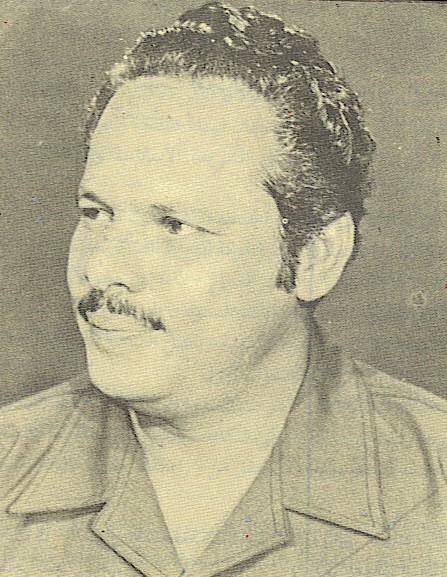 علي
ناصر محمد الحسني : 1980 – 1986 : علي
ناصر محمد الحسني : 1980 – 1986 :
الميلاد في دثينه بأبين
العام 1939.
تخرج العام 1959 في دار
المعلمين العليا فعين اثر ذلك مديراً لمدرسة دثينة
الابتدائية.
انضم الى الكفاح المسلح ضد
الاستعمار البريطاني منذ اندلاعه، واصبح عضواً في المكتب
العسكري.
عين بعد الاستقلال 1967
حاكماً على الجزر اليمنية، ثم حاكماً على المحافظة
الثانية(لحج) 1968.
مارس / آذار 1968 عضواً في
القيادة العامة للجبهة القومية.
ابريل / نيسان 1969 وزيراً
للحكم المحلي ثم وزيراً للدفاع 1969 – 1975 اضافة الى
منصبه كوزير للتربية 1974 – 1975.
اغسطس / آب 1971 اصبح رئيساً
للوزراء وعضواً في المجلس الرئاسي الى جانب اسماعيل وربيّع
1971 – 1978، وبعد الاطاحة بربيّع ، اصبح رئيساً بالوكالة
وذلك قبل ان يتم اختيار اسماعيل لهذا المنصب، الإّ ان
الجبهة عقدت مؤتمراً استثنائياً في اكتوبر / تشرين اول
1980 ، وقررت تنحية عبد الفتاح وتعيين ناصر رئيساً للدولة
واميناً عاماً للحزب ورئيساً للوزراء.
وفي فبراير / شباط 1985 تخلى
عن منصب رئيس الوزراء، واستمر رئيساً للدولة واميناً عاماً
للحزب حتى 13/1/1986 اندلاع الاحداث الدامية التي استمرت
اكثر من اسبوع وخلفت الآف القتلى.
يشغل حالياً منصب رئيس
المركز العربي للدراسات الاستراتيجية ومقره العاصمة
السورية دمشق.
Ali Nasser Mohammed:
(1980-1986)
He was born in Datheena of
Abyan in 1939.
In 1959, he graduated from
teachers school and became the principal of Datheena
school.
Since armed struggling has
started against British occupation, he joined it and
became a member in the military
office.
In 1967, after independence,
he was nominated as a ruler of Yemeni islands and as
Lahj district’s governor.
In 1967, he participated as a
member of National Public Front
Leadership.
In April 1969, he became the
president.
From 1969 to 1975, he became
the Defense Minister.
From 1974 to 1975, he worked
as the Minister of Education.
In August 1971, he became the
Prime Minister and a member in the Presidential Council
beside Ismail and Rabaae.
After bringing down Rabeea’s
authority, Ali became the President by proxy before
Ismail’s winning of the election for that position. Then
the party has decided to held a meeting in October 1980
to depose Abdulfatah and nominating Nasser as the
President, secretary-general of the party and the Prime
Minister.
In February 1985, he resigned
from the Prime Minister position and remained the
President and secretary-general of the party until the
thirteenth of January 1986, the beginning of bloody
events that lasted for more than a week leaving
thousands of dead people behind.
Nowadays, he is the president
of the Arab Center for strategic studies which located
in the capital city of Syria
Damascus.
Né à Datheena d’Abyan en
1939
Diplômé en 1959 de l’école
normale il est nommé Principal de l’école de
Datheena.
Il s’est joint à la lutte
armée contre l’occupation britannique depuis ses débuts
et devient membre deu bureau
militaire.
En 1967, au lendemain de
l’indépendance, il est nommé gouverneur des Iles
Yéménites et du district de Lahej.
En 1967 il devient membre du
bureau directeur Front Publique
National.
En avril 1969, il accède à la
présidence.
De 1969 à 1975, il est
ministre de la défense, puis de 1974 à 1975, ministre de
l’éducation.
En août 1971 on le retrouve
premier ministre et membre du conseil présidentiel à
côté de Abdulfatah Ismail et Salim Roubaya
Ali.
Après avoir sapé l’autorité de
Salim Roubaya Ali, Ali Nasser Mohammed se
hisse à la présidence par procuration devançant la
victoire des urnes qui revient à Abdulfatah Ismail. Le
parti décide alors de tenir un congrès extraordinaire en
octobre 1980 pour déposer Abdulfatah Ismail et
nommer Ali Nasser Mohammed pour tenir les rênes du
pouvoir en devenant à la fois Président, secrétaire
général du parti et Premier Ministre.
En février 1985, il
démissionne de son poste de Premier Ministre mais reste
président et secrétaire général du parti jusqu’au 13
janvier 1986 où éclate une insurrection entre factions
rivales du gouvernement. Le bain de sang se poursuivra
une semaine durant laissant des milliers de morts
derrière lui.
Aujourd’hui, il est Président
du centre Arabe d’Études Stratégiques situé dans la
capitale Syrienne à Damas.
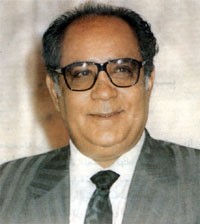 حيدر ابو بكر العطاس : 1986 – 1990
: حيدر ابو بكر العطاس : 1986 – 1990
:
الميلاد بمدينة حريضة
محافظة حضرموت 1939.
حائز على شهادة البكالوريوس
في الهندسة الكهربائية من جامعة القاهرة
بمصر.
ساهم في تأسيس فرع حركة
القوميين العرب بحضرموت 1960.
انضم الى الجبهة القومية
لتحرير الجنوب اليمني المحتل منذ تاسيسها
.
انتخب عضواً في اللجنة
المركزية للتنظيم السياسي للجبهة القومية العام
1972.
اُنتخب عضواً في اللجنة
المركزية للحزب الاشتراكي اليمني وفي المؤتمر الاول للحزب
عضواً في المكتب السياسي ]اعلى
هيئة[
فبراير/ شباط 1985، ثم عين في منصب رئيس
الوزراء.
فبراير/شباط 1986
اُنتخب رئيساً لهيئة مجلس الشعب الاعلى ]منصب شرف[.
عين رئيساً لوزراء أول حكومة
بعد تحقيق الوحدة وقيام الجمهورية اليمنية في 22 مايو/
آيار 1990.
Haider Abu Bakr al-Attas
(1986-1999)
He was born in Harethah of
Hadramout district in 1939.
He got a bachelor degree
of electricity engineering in Cairo University in
Egypt.
He participated in founding
the branch of National Arab Organization in Hadramout in
1960.
He joined the National Front
of liberation the south since it has
started.
He was elected to be a member
in the Central Committee of Yemeni socialist’s party and
as a member of the party in the political office in
February 1985. Later, he was nominated as the Prime
Minister.
In February 1986, he was
elected to be the president of higher people's council
committee (an honored position).
He was also nominated to be
the president of the first government after achieving
the unification on 22nd of May 1990.
Il naquit à Harethah
(Hadramout) en 1939
Il obtient un bac eb génie
électrique de l’université du Caire en
Égypte.
Il est membre fondateur de
l’organisation arabe nationale en Hadramout en
1960.
Il rejoint le Front National
de Libération dès sa création
Iul est élu membre du comité
central du parti socialiste yéménite et membre du bureau
politique du parti en février 1985. Plus tard, il
deviendra Premier Ministre.
En février 1986 il est élu au
grade honoraire de président du comité du conseil des
élites.
Il est également nommé
président du premier gouvernement né au lendemain de la
réunification des deux Yémen, le 22 mai
1990.
 علي سالم البيض : 1986 –
1994 : علي سالم البيض : 1986 –
1994 :
الميلاد عام 1939
بمحافظة حضرموت، تلقى تعليمه الابتدائي والمتوسط
فيها.
انتمى مبكراً الى حركة
القوميين العرب، وكان من الشخصيات الاساسية في تنظيم
الجبهة القومية، فتولى قيادة العمل العسكري في المنطقة
الشرقية، حضرموت – المهرة ضد الاحتلال
البريطاني.
تلقى عدداً من الدورات
العسكرية في القاهرة في الستينيات وكان له موقف معارض بشدة
ضد الدمج بين القومية وجبهة التحرير(واجهتا المستعمر معاً
وفق وجهة نظر مختلفة في فلسفة الثورة والكفاح المسلح
لتتقاتلا في فترة لاحقة ) واعلن انسحابه من تنظيم الجبهة
القومية وتشكيل تنظيم بديل اسمه (الجبهة الشعبية لتحرير
حضرموت).
بفشل الدمج عاد الى تنظيمه
الأم مع مجموعته التي انتزعها.
شغل موقع نائب عن شؤون الجيش
والأمن في ما كان يسمى بالحكومة المؤقتة قبل يوم
الاستقلال.
تولى منصب وزير الدفاع في
اول حكومة دولة الاستقلال حتى عام 1966.
تقلد اكثر من منصب حكومي في
مرحلة ما بعد حركة 22 يونيو / حزيران
1969.
ظل عضواً للمكتب السياسي
للجبهة القومية ثم الحزب الاشتراكي.
تم تجريده من مناصبه الحزبية
والحكومية في عهد عبد الفتاح اسماعيل في 79-80 بسبب ما قيل
حينها عن اختراقه اللوائح الحزبية وقانون الأحوال الشخصية
الذي يمنع الجمع بين زوجتين.
عاد الى واجهة الحياة
السياسية في حكومة علي ناصر وتولى وزارة الحكم
المحلي.
بانفجار احداث 13 يناير/
كانون ثان 1986 كان من الشخصيات التي تمحورت حول مجموعة
عبد الفتاح ونجا من الموت باعجوبة صبيحة ذلك اليوم في مبنى
اللجنة المركزية، وخرج متخفياً في احدى المدرعات مع عبد
الفتاح اسماعيل، غير ان الاخير اغتيل بصورة غامضة بينما
نجا هو.
تولى منصب الأمين العام
للحزب الاشتراكي اليمني عقب تلك الاحداث
الدموية.
وقع في 30 نوفمبر/ تشرين ثان
1989 مع الرئيس علي عبدالله صالح على اتفاقية عدن الوحدوية
ودستور دولة الوحدة.
باعلان قيام الجمهورية
اليمنية في 22 مايو / آيار 1990 تولى منصب نائب رئيس مجلس
الرئاسة اضافة الى موقعه الحزبي كامين عام للاشتراكي حتى
مايو / آيار 1994 .
21 مايو / آيار 1994 حتى 7
تموز / يوليو من نفس العام رئيساً لجمهورية اليمن
الديمقراطية المعلنة لمدة لم تتجاوز الشهر
تقريباً.
يقيم حاليا في سلطنة عمان
بعد ان منحته حق اللجوء السياسي.
Ali Salem Al-Beidh
(1986 -1994)
He was born in Hadramout
district in 1939 where he received his elementary and
secondary study.
He initially joined the
National Arab Organization and became one of their main
individuals. He was also in charge of leading the
military work in the eastern area.
( Hadramout - Almahrah)
against British Occupation.
He received a number of
military courses in Cairo in the 60s, stood against
merging between nationalism and Liberation Front which
they have faced together the British Occupation having
different prospective in Revolution and Struggling
philosophy to fight in the next period and declared his
retreat from National Front Organization and forming
alternative organization called Public Front for
Hadramout liberation.
With the merging failure, he
reorganized his group, which he has taken by
force.
Before the Independence Day,
he was the deputy of the army and security affairs in a
place called temporary government.
He was the Defense Minister in
the first independent government until
1966.
He was in charge of many
governmental positions in the 22nd of June movement in
1969.
He remained a member of the
political office for the National Front and for
socialist’s party.
He was deprived of
partisanship and governmental positions in Abdulfatah’s
period of rule in 1979 and 1980 because of the party’s
rules violation and the law of personal affairs, which
prevents marrying two wives.
He returned back to practice
politics in the government of Ali Nasser and was in
charge of Ministry of National Law.
When January 1986 events
started, he was one of the characters that surrounded
Abdulfatah and incredibly survived from death in the
morning of that day in the central committee
building.
He escaped hiding in an
armored vehicle with Abdulfatah who was assassinated in
a mysterious way while he survived.
He became the
general-secretary of Yemeni socialist’s party after
those tragic bloody events.
On the thirtieth of November
1989, he signed an agreement called Aden Agreement and
the one country constitution with the President Ali
Abdullah Saleh.
On the twenty second of May
1990, when Republic of Yemen has been established, he
became the deputy of the Presidential Council and the
general-secretary of socialist’s party in the south
before unification.
He was the President of the
Democratic Republic of Yemen from 21st of May to 7th of
June 1994.
He currently lives in Oman as
a Political Refugee.
Né en Hadramout en 1939, où il
poursuivra ses etudes primaries et
secondaires.
Au départ il rejoint
l’organisation nationale arabe devenant l’un des membres
principal.
Il se vit attribuer la
responsabilité des opérations militaires contre le
régime d’occupation britannique pour le secteur est du
pays (provinces d’Hadramaout et d’ Al
Marah)
Il suivit des cours de
formation militaire au Caire dans les années 60 avant de
se dresser contre les différences qui voyaient le jour
entre nationalisme et front de libération qui tous deux
affrontaient l’occupation britannique. En dépit de leur
objectif commun, leurs perspectives révolutionnaires et
leur philosophie du combat étaient bien différentes. Il
annonça alors son retrait du Front National de
Libération pour former une nouvelle entité, le front
publique pour la libération de l’
Hadramout.
La séparation l’obligea à
réorganiser son groupe où il avait pris le pouvoir par
la force. Avant la proclamation de l’indépendance il
était le représentant de l’armée et de la sécurité au
sein d’un gouvernement provisoire.
Il fut ministre de la défense
dans le premier gouvernement indépendant jusqu’en
1966.
Il cumulait de nombreuses
responsabilités gouvernementales dans le gouvernement
qui naquit à la suite du mouvement du 22 juin
1969
Il conserva les fonctions de
membre du bureau politique du Front National et du parti
socialiste
Il fut privé de collaboration
et de participation au gouvernement durant la période de
pouvoir d’ Abdulfatah Ismail en 1979 et 1980 en
raison de la violation des règles du parti et de la loi
sur les affaires personnelles qui interdisaient de
prendre deux épouses.
Il fit son retour en politique
dans le gouvernement d’Ali Nasser Mohammed où il devint
ministre de la loi nationale.
Au début des évènements
sanglants de janvier 1986, il fut l’un de ceux qui
soutenait Abdulfatah Ismail et échapperpar
miracle à la mort ce matin là dans le bâtiment du comité
central.
Il prendra la fuite, dissimulé
dans un véhicule blindé, avec Abdulfatah Ismail qui
sera mystérieusement assassiné alors que lui
survivra.
Il devint alors secrétaire
général du parti socialiste yéménite après ces tragiques
évènements
Le 30 novembre 1989, il signe
avec le Président Ali Abdullah Saleh « L’accord
d’Aden » sur la constitution unique du nouveau
Yémen
Le 22 mai 1990 après
l’installation de la République du Yémen, il devint vice
président du conseil présidentiel et secrétaire général
du parti socialiste au sud avant la
réunification
Il fut président de la
République Populaire et Démocratique du Yémen du 21 mai
au 7 juin 1994
Actuellement il vit en Oman où
il est réfugié politique.
_____________________________________________________________

المشير الركن : علي
عبدالله صالح الأحمر 1978-2012
من مواليد عام 1942م في قرية بيت
الأحمر منطقة سنحان – محافظة صنعاء.
تلقى دراسته الاولى في(
معلامة) قريته او مايسمى في بعض البلدان بالكُتاب.
التحق بالقوات المسلحة
عام 1958م.
التحق بمدرسة صف ضباط
القوات المسلحة عام1960 .
قامت ثورة سبتمبر /
ايلول وهو برتبة رقيب وشارك في احداثها، ورقي في 1963 الى
رتبة ملازم ثان.
في عام 1964 التحق
بمدرسة المدرعات ، وتولى العديد من المهام القيادية في هذا
المجال.
1975- 1978 قائداً للواء
تعز وقائدا لمعسكر خالد بن الوليد.
في 24/6/1978( بعد
اغتيال الغشمي) اختير عضواً بمجلس رئاسة الجمهورية المؤقت
ونائباً للقائد العام للقوات المسلحة ورئيساً لهيئة
الأركان.
اُختير في 17 يوليو / تموز 1978 رئيساً للجمهورية
وقائداً عاماً للقوات المسلحة.
في 22 مايو / آيار
1990اُختير رئيساً لمجلس رئاسة الجمهورية اليمنية
الموحد.
www.presidentsaleh.gov.ye
Marchal
: Ali Abdullah Saleh(1978 -2012)
Born
in 1942 in Beit Al-Ahmar village (Senhan District) of
Sana'a province
Spent
preliminary studies in the reciting center and developed
his general
knowledge
while enrolling with the army cadre.
Joined
the school of the non-commissioned line of Military
commanding officers in 1960.
He
was among the non-commissioned army officers who
participated in the revolution of 26th September 1962.
At that phase, he was ranked a sergeant
During
the initial months of the revolution _ and in
appreciation to his efforts and what he showed of
bravery and valence in defending the revolution and
Republic in the various regions, he was promoted to the
rank of adjutant military officer
Participated
in the battles of defending the revolution and Republic
in many of the Republic's regions.
In
1963 was promoted to the rank of second
lieutenant.
In
the eastern region of Sana'a province, he was injured in
1963 while taking part in one of the defense
battles.
In
1964, joined the school of armored troops, and finished
a special course in armored battling.
Upon
graduation, he came again to participate in more than
one region of the Republic defending the revolution and
Republic existence _ He was subjected to splinters of
gun fire, and was injured more than once. He showed in
these battles rare bravery, skill of command and
consciousness and awareness of the national
issues
Was
once of the heroes of Al-Sabeen war (1970) when Sana'a
came under besiege
Was
engaged in many military ranks such as:
-
Commanding officer of an armored troop.
-
Commanding officer of an armored detachment.
-
Military general staff of an armored
battalion.
-
Director of armored troops' provision
division.
-
Commanding officer of an armored battalion and
officer-in-charge of Bab Al-Mandab
defending
sector.
-
Commanding officer of Taiz military battalion and Camp
Regiment Officer of Khaled Bin Al-Waleed
(1975-1978).
Represented
singly and jointly, the country within many
official-negotiating discussions dealt with several
brotherly and friendly countries.
Held
the post of a member of the Provisional Presidential
Council and Vice General commander and Chief Staff of
the Armored Forces at the time of ex-president
Al-Ghashmi's murder on Jun. 24th, 1978.
Elected
by the Founding Peoples Assembly on Jul. 17th, 1978
President of the Republic and General Commander of the
Armed Forces.
On
Sep. 17th, 1979 he was promoted a "colonel" according to
the consent of an overwhelming majority of all
leaderships and divisions of the Armed Forces, as
courtesy, honesty and devotion to the efforts he showed
in constructing and developing the Armed Forces and
security on the basis of modern fundamentals
Elected
general secretary of GPC on Aug. 30th, 1982.
Re-elected
President of the Republic on May 23rd, 1983, as well as
general commander of the Armed Forces.
In
1989 was bestowed the Honorary Master Degree in Military
Science by the College of Leadership and Military
General Staff.
On
May 21st, 1990 Al-Shoura Council voted unanimously of
bestowing him the rank of Lieutenant General as courtesy
and devotion of what he had shown sincerely in
unification of the homeland and creation of the Yemen
Republic.
On
May 22nd, 1990 he raised the new flag of the Republic of
Yemen in Aden, declared re-unity of Yemeni unity and
ending forever the fragmentation. On the same day, was
chosen President of the Republic's Presidential
Council.
The
newly elected Parliament chosen Ali Abdullah Saleh
President of Presidential Council on Oct. 16th,
1993.
Embarked
upon the conspiracy of the successioners in summer 1994
and led war against them for three months till victory
was achieved on Jul. 7th, 1994.
Elected
by the Parliament on Oct. 1st, 1994 President of the
Republic upon concision of the procedures on the
constitutional amendments, which were then endorsed on
Sep. 28th, 1994.
On
Dec.24th, 1997 Parliament approved rewarding him the
rank of Field Marshal as an appreciation for his
historic and national role in building the new Yemeni
territory.
Exerted
all his efforts in achieving an overall development of
Yemen such as reconstructing the Great Mareb Dam,
extraction of petrol and natural gas, initiating Aden
Free Zone and other great achievements.
Considered
the founder of the new Yemen's state based on democratic
principles, political pluralism, freedom of the press,
respect of human rights and principle of peaceful
transfer of authority.
Il
est né en 1942 dans le village de Beit Al-Ahmar
(Senhan un quartier de Sana'a. Il a fait ses
études de base au centre de recrutement militaire avant
d’accroître ses connaissances en s’engageant dans
l’armée. Il entre en 1960 à l’école militaire pour
devenir élève officier et fera partie du groupe d’élèves
officiers qui participeront à la révolution du 26
septembre 1962. Il obtient alors le grade de
sergent.
Dès
le début de la révolution, ses efforts, sa bravoure, et
la vaillance dont il fait preuve dans plusieurs régions
du pays lui valent d’être promu au rang
d’adjudant.
À
ce titre il participe à de nombreux combats à travers le
pays et devient sous-lieutenant en 1963 avant d’être
blessé la même année lors d’affrontements à l’est de la
capitale, Sana’a.
En
1964 il rejoint l’école militaire des blindés où il
reçoit une formation approfondie dans la spécialité de
combat de chars.
À
l’issue de cette formation il poursuit la lutte pour
défendre la révolution et l’existence de la République.
Blessé à plusieurs reprises, il fait preuve tout au long
de cette lutte d’une rare bravoure, de leadership et
d’une grande conscience nationale.
Il
gravit rapidement les échelons de la hiérarchie
militaire et occupe successivement les postes
de :
commandant
d’escadron de blindés
commandant
de détachement de blindés
chef
d’état major d’un bataillon de blindés
chef
de division pour l’approvisionnement des troupes
blindées
Commandant
en chef d’un bataillon de blindés et officier
responsable du secteur de Bab Al Mandeb
Commandant
de la garnison de Taiz et aide de camp de Khaled Bin
Al-Waleed (1975-1978)
Il
a représenté le pays seul et en commission, lors de
nombreuses discussions et négociations avec des pays
frères ou amis.
Plus
tard il est devenu membre du conseil provisoire de la
Présidence, Vice général en chef et chef d’état-major
des forces blindées à l’époque de l’assassinat de l’ex
président Al Ghashmi le 24 juin 1978.
Le
17 juillet 1978, il est élu par les fondateurs de
l’assemblée, Président de la République et Commandant en
chef des forces armées.
Le
17 septembre 1979, il est élevé au rang de
« colonel » par un consensus, à une écrasante
majorité, de tous les chefs et responsables des forces
armées en récompense de sa courtoisie, son honnêteté et
son dévouement dans les efforts qu’il a inlassablement
déployés pour structurer et développer les forces armées
et les forces de sécurité sur des bases
modernes.
Le
30 août 1982 Ali Abdullah Saleh est élu secrétaire
général du GPC. Le 23 mai 1983 il est réélu Président de
la République du Yémen et commandant en chef des forces
armées.
En
1989 il se voit décerner une maîtrise honoraire en
science militaire délivrée par le collège de
commandement et d’état-major militaire.
Le
21 mai 1990 l’assemblée de la Shoura vote à l’unanimité
sa nomination au grade de Lieutenant Général en
remerciement de son dévouement à la cause de la
réunification des deux territoires du Nord et du Sud
pour former une seule patrie en consacrant
l’établissement de la République du Yémen.
Le
22 mai 1990, il monte les couleurs de la république du
Yémen à Aden déclarant la réunification des deux états
sous un seul drapeau en abolissant pour toujours la
séparation. Le même jour il est choisi comme Président
du Conseil Présidentiel de la
République »
Le
Parlement nouvellement élu désigne Ali Abdullah
Saleh comme Président du Conseil Présidentiel le 16
octobre 1993.
Il
est alors entraîné dans une lutte contre les membres de
la conspiration pour la succession dans l’été 1994 et se
trouve contraint de combattre ce groupe en conduisant
une guerre de trois mois qui voit finalement sa victoire
le 7 juillet 1994.
Le
1er octobre 1994 le Parlement l’élit Président de la
République à l’issue des procédures sur les amendements
constitutionnels entérinés par l’assemblée le 28
septembre 1994.
Le
27 décembre 1997, le Parlement approuve son accession à
la dignité de Maréchal du Yémen en remerciement de son
dévouement à la cause de la nation et de l’histoire dans
la naissance du nouveau territoire yéménite
Il
a dévolu avec succès tous ses efforts au développement
du Yémen, entre autres, la reconstruction du barrage de
Mareb, l’extraction du pétrole et du gaz naturel, la
création d’une zone franche à Aden et d’autres grandes
réalisations.
Il
est regardé comme étant le fondateur du nouvel état
yéménite qui s’appuie sur des principes démocratiques,
le pluralisme politique, la liberté de la presse, le
respect des droits de l’homme et le principe de la
transmission non violente du pouvoir.
المشير الركن : عبدربه
منصور هادي الاقرن Abed Rabbo
Mansour
Hadi
من
مواليد عام 1944م ، قرية ذكين ،مديرية الوضيع، محافظة
أبين.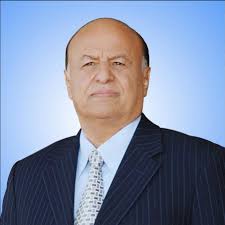
- خريج
كلية سان هيرست الملكية البريطانية.
- حاصل
على درجة الماجستير من أكاديمية ناصر العسكرية بجمهورية
مصر العربية.
- حاصل
على درجة الماجستير من أكاديمية فرونزا في الاتحاد
السوفيتي السابق.
تقلد عدداً من
المناصب القيادية العسكرية والسياسية في جنوب الوطن قبل
الوحدة أهمها:-
- قائد
فصيلة مدرعات.
- قائد
سرية مدرعات.
- أركان
سلاح المدرعات.
- أركان
الكلية الحربية.
- مدير
مدرسة المدرعات.
- مدير
دائرة التدريب.
- قائد
محور عملياتي (كرش).
- مساعد
رئيس هيئة الأركان العامة للشؤون الإدارية.
- رئيس
دائرة الإمداد والتموين العسكري.
- نائب
رئيس الأركان لشؤون الإمداد والإدارة.
كما تقلد مناصب
قيادية عليا بعد قيام الجمهورية اليمنية عام 1990م
أهمها:
- مستشار
مجلس الرئاسة عام 1990م.
- قائد
محور البيضاء.
- وزير
الدفاع مايو 1994م.
- نائب
رئيس الجمهورية 4/10/1994م
- رقي
إلى رتبة الفريق عام 1997م.
- رقي
إلى رتبة المشير عام 2012م.
- انتخب
نائباً لرئيس المؤتمر الشعبي العام في المؤتمر العام
الخامس وأعيد انتخابه لمرتين في المؤتمر العام السادس
والمؤتمر العام السابع لنفس المنصب.
- انتخب
نائباً أول لرئيس المؤتمر وأميناً عاماً للمؤتمر الشعبي
العام من قبل اللجنة الدائمة الرئيسية للمؤتمر الشعبي
العام في دورتها الاستثنائية المنعقدة في 12 نوفمبر 2008م.
|